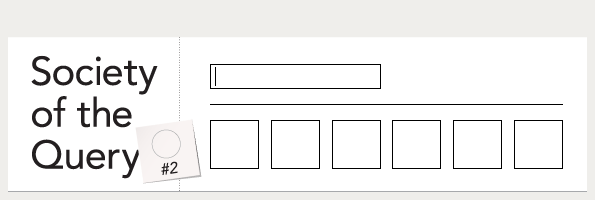
Florian Cramer, head of the Networked Media Master at the Piet Zwart Institute in Rotterdam, ended the last session of The Society of the Query conference. The Alternative Search 2 session presented a few of the latest web technologies as potential directions for the web and search engine design in the near future: RFDa, which would make the shift to what Steven Pemberton named the web 3.0, and semantic search, as implemented in the Europeana project.
Florian Cramer concluded this series of presentations with a critical and somewhat pessimistic evaluation of the current state of the web and the idea of a semantic web and semantic search, as one of its potential futures. His three main arguments revolved around: “why search is not just web search (and not just Google),” “why semantic search is flawed,” and “why the world wide web is broken.”
The first point expressed his frustration with the narrow understanding of the notions of query and search engine on which the conference focused. As he explains, wikis and social networking sites also include the search engine functionalities.
 As far as semantic search is concerned, Cramer usefully pointed out to the difference between folksonomies, the currently used form of semantic tagging, and the universal semantic tagging which a semantic web would require. While folksonomies are “unsystematic, ad-hoc, user-generated and site-specific tagging systems,” (Cramer, 2007), like the tagging systems of Flickr for example, the semantic web would require a structured, universal tagging and classification system which would apply to the entire web. Cramer is skeptical of the possibility to create this unified, ‘objective’, meta-tagging system because classifications, or taxonomies, are not arbitrary but expressions of ideologies, which would call for the discussion of the politics of meta-tagging. While meta-tagging may have its advantages, such as arguably empowering the web users and weakening the position of large web services corporations, although still maintaining the necessity of search engines to aggregate data, it also has several potential weaknesses. The semantic web model must be based on trust in order to prevent some predictable problems, such as massive spamming.
As far as semantic search is concerned, Cramer usefully pointed out to the difference between folksonomies, the currently used form of semantic tagging, and the universal semantic tagging which a semantic web would require. While folksonomies are “unsystematic, ad-hoc, user-generated and site-specific tagging systems,” (Cramer, 2007), like the tagging systems of Flickr for example, the semantic web would require a structured, universal tagging and classification system which would apply to the entire web. Cramer is skeptical of the possibility to create this unified, ‘objective’, meta-tagging system because classifications, or taxonomies, are not arbitrary but expressions of ideologies, which would call for the discussion of the politics of meta-tagging. While meta-tagging may have its advantages, such as arguably empowering the web users and weakening the position of large web services corporations, although still maintaining the necessity of search engines to aggregate data, it also has several potential weaknesses. The semantic web model must be based on trust in order to prevent some predictable problems, such as massive spamming.
In the concluding section, Cramer expressed his concern that the Internet as a medium for publication and information storage is not sustainable and argued for redundancy in web archiving. However this desire for permanence raises questions about the nature of the medium itself.


